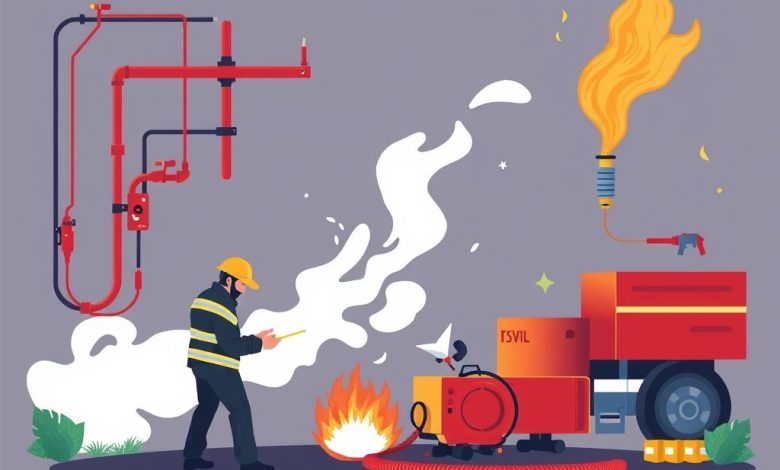Field Service Management for Fire Suppression Systems

Field Service Management for Fire Suppression Systems
Introduction
Field service management (FSM) plays a crucial role in maintaining fire suppression systems across various industries. These systems are designed to quickly respond to potential fires, protecting people, property, and equipment. Effective FSM ensures that fire suppression systems remain operational, reducing the risk of damage from unexpected blazes. In this article, we will explore the importance of FSM for fire suppression systems, its key components, best practices, and challenges faced by field service managers.
Key Components of Field Service Management for Fire Suppression Systems
- Scheduling and Dispatching
- Efficient scheduling algorithms prioritize jobs based on urgency and location
- Real-time dispatching ensures quick response times
- Mobile apps allow technicians to receive job assignments and navigate to locations
2. Inventory Management
- Automated inventory tracking prevents stockouts of critical components
- Barcode scanning and RFID technology streamline part identification
- Just-in-time ordering reduces storage costs while ensuring parts availability
3. Work Order Management
- Digital work orders streamline communication between dispatchers and technicians
- Automated reminders prevent missed appointments or delayed responses
- Customizable fields allow for detailed job descriptions and priority levels
4. Technician Management
- Skill-based routing assigns jobs based on technician expertise
- Performance tracking metrics evaluate technician efficiency and quality
- Training modules ensure technicians stay updated with latest system technologies
5. Customer Relationship Management (CRM)
- Integrated CRM systems track customer history and preferences
- Automated notifications keep customers informed of service status
- Customizable reports provide insights into customer satisfaction and repeat business potential
Best Practices for Field Service Management of Fire Suppression Systems
- Regular Maintenance Scheduling
- Implement preventive maintenance programs to catch issues before they become critical
- Use predictive analytics to identify potential problems based on historical data
- Create customized maintenance schedules based on system usage and environmental factors
2. Technicians’ Continuous Training
- Provide regular training sessions on new technologies and system updates
- Conduct quarterly refresher courses on fire suppression system operation and safety procedures
- Encourage cross-training among technicians to improve versatility and response times
3. Quality Control Measures
- Implement checklists for each type of service performed
- Conduct random audits of completed work orders to ensure quality standards are met
- Establish clear protocols for addressing customer complaints and resolving issues promptly
4. Safety Protocols
- Ensure all technicians undergo regular fire safety training
- Maintain up-to-date emergency response plans for unexpected situations
- Equip technicians with personal protective equipment (PPE) appropriate for their roles
5. Data Analysis and Reporting
- Utilize FSM software to generate comprehensive reports on system performance and technician productivity
- Analyze trends in service requests to identify common issues and optimize resource allocation
- Share key findings with management to inform strategic decisions and budget planning
Challenges Faced by Field Service Managers
- Rapid Technological Advancements
- Keeping pace with evolving fire suppression technologies requires continuous learning
- Integrating new tools and systems into existing workflows can be time-consuming and challenging
2. Regulatory Compliance
- Adhering to local, national, and international fire safety regulations is crucial
- Staying updated on changing regulations and industry standards presents ongoing challenges
3. Balancing Efficiency and Quality
- Meeting tight deadlines while ensuring high-quality service delivery can be demanding
- Finding the right balance between speed and thoroughness is essential for maintaining customer trust
4. Managing Remote Teams
- Coordinating field operations across multiple locations can be complex
- Ensuring consistent communication and adherence to company policies in remote teams is crucial
5. Budget Constraints
- Allocating resources effectively within limited budgets requires careful planning
- Balancing investment in technology and human resources with operational costs is a constant challenge
Conclusion
Field service management plays a vital role in maintaining the effectiveness of fire suppression systems. By implementing efficient scheduling algorithms, managing inventory accurately, and providing continuous training to technicians, field service managers can significantly reduce the risk of fires and protect people and property.
While challenges exist, the benefits of effective FSM far outweigh the difficulties. By leveraging advanced technologies, adhering to best practices, and continuously improving processes, field service managers can create robust fire suppression systems that respond quickly and efficiently to emergencies.
As the field service industry continues to evolve, it’s crucial for managers to stay adaptable, embrace new technologies, and prioritize both efficiency and quality in their operations. By doing so, they can ensure that fire suppression systems remain at peak performance, ready to respond to any potential threat with precision and speed.




